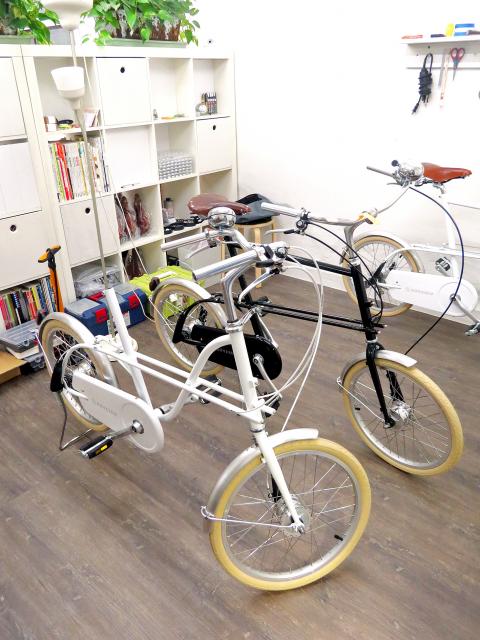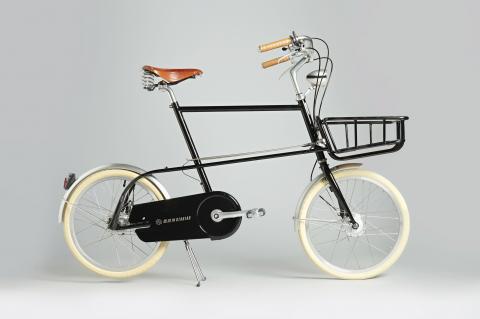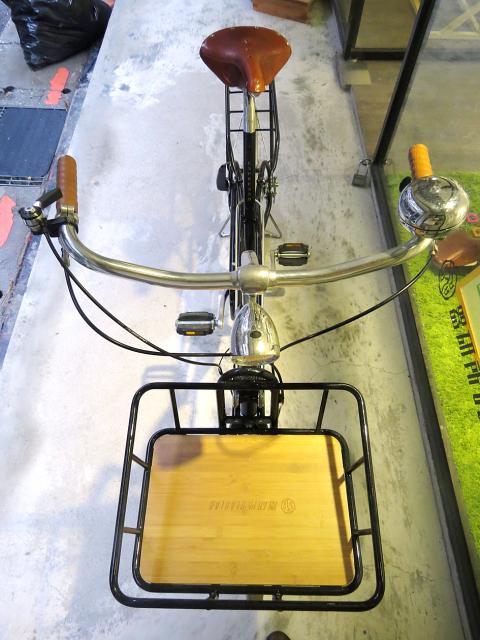In Taiwan’s bicycle manufacturing industry, research and development is concentrated in road bikes, which enjoy a high profit margin. Ninety percent of Giant’s catalog is mountain bikes, road bikes and racing bikes, and last year leaders like Merida vied to release lightweight racers for export to western countries.
However, Henry Chang (張博翔) and Cesare Sun (孫崇實), whose bike design won this year’s Golden Pin Design Award, believe that the future of the industry is not in road bikes.
“A focus in urban cycling will be the next trend of bike development,” says Chang, an industrial designer. “The [road] bike market is already saturated.”

Photo: Enru Lin, Taipei Times
Last year was notably tough for Taiwanese manufacturers. Exports to the US — a main market — fell 8 percent, costing manufacturers an estimated US$43 million in lost sales at wholesale, according to the US Department of Commerce.
In their race to bring road bikes to western markets, Taiwanese industry leaders have ignored the potential of the commuter bike aimed at the urban Asian market, the designers say.
They argue that using a road bike for urban commuting is overkill and a source of dangerous problems. For example, the handlebars of a mountain bike force the cyclist into a forward-leaning position, which partially obstructs the view of traffic.

Photo courtesy of Gearlab
“Holland and Denmark do make bikes that are perfect for riding to work. But because Caucasian and Asian bodies are proportioned differently, those bikes aren’t a good solution for us,” Chang says.
“So there’s a huge market opportunity here, but not many people are looking into it,” Chang says.
TWO MEN AND A BIKE

Photo: Enru Lin, Taipei Times
Chang and Sun stood out as the only two designers in a sea of engineer hires at local computer manufacturer Asustek Computer Inc (華碩). Later, they drew notice as enthusiastic eco-conscious young men who rolled up to the office on bikes.
“Commuting in cities by bike is really a point of pride,” Sun says.
Chang agrees. After three years at Asustek, the two were hired at the same time by Demos Chiang’s (蔣友柏) Dem Inc to design bikes under contract for Giant.
“That’s all we wanted to do — [design] bikes,” Chang says.
“First of all, it was our personal interest. Secondly, bikes are a tremendous challenge, because the appearance is the structure … When you change the appearance of the frame, you change its structure and you get a completely different effect.”
In 2008, Chang and Sun left Dem Inc to start Gearlab, named for its mission to become a star bike-design studio. For the first few years, they designed mostly teapots and mugs, struggling to build capital for developing their dream bike. In between, they conducted market research.
“We considered the different options for a long time. It wasn’t until 2011 that we knew what bike we wanted to go with,” Sun says.
Manufacturers like Giant, Merida and Fritz Jou make mid to high-end bikes for sport use that are purchased by athletes — and by urban consumers who don’t see a better option for commuting. The fold-up bicycle’s popularity in cities peaked around 2009 and, Chang says, is unlikely to return because “an easy-to-ride bike is hard to fold, and an easy-to-fold bike is hard to ride.”
This year, he and Sun put their first bike on the market. The Espresso is a non-foldable bike designed for the East Asian market, and it’s been named a winner of this year’s Golden Pin Design Award.
Unlike a mountain bike, the Espresso permits pedaling in an upright position for a better view of traffic. It also comes with a large kit of accessories tailored for the urbanite: a kickstand, chain guard, LED lights, bike lock, a cargo rack that doesn’t move with the handlebar and a bell with a jaunty two-tone ring so “pedestrians will think you’re funny instead of getting mad when you use it,” Chang says.
THE ROAD AHEAD
Chang and Sun say that for Taiwan’s bicycle manufacturing industry, the commuter bike is a very promising product that needs more development. Giant currently makes some of the best road bikes in the world, but its city-friendly bikes are far less competitive because in-house designers are hired for their background in high-performance engineering.
“Giant finds it hard to extricate itself from the [road] bike mindset. For example, in one lifestyle bike we were designing for them, we suggested adding a chain guard to prevent pant stains … Giant thought it didn’t look sporty or it would add too much weight,” Sun says.
A large company like Giant needs a fundamental shift in approach before it will be able to develop a superb commuter bike. And for a smaller design studio, the task is even tougher, Chang says.
After two years of accepting bicycle design contracts, Dem Inc wanted to move on. That’s because in the design industry, much of the money is elsewhere — for instance in gifts for exhibitions, where contracts are generous and frequent. Designing one bike, in comparison, is time-consuming and rarely cost-effective.
“It’s hard to earn money developing bike concepts,” he says. “As a result, while Taiwan manufactures many bikes, very few people are designing them.”

Growing up in a rural, religious community in western Canada, Kyle McCarthy loved hockey, but once he came out at 19, he quit, convinced being openly gay and an active player was untenable. So the 32-year-old says he is “very surprised” by the runaway success of Heated Rivalry, a Canadian-made series about the romance between two closeted gay players in a sport that has historically made gay men feel unwelcome. Ben Baby, the 43-year-old commissioner of the Toronto Gay Hockey Association (TGHA), calls the success of the show — which has catapulted its young lead actors to stardom -- “shocking,” and says

The 2018 nine-in-one local elections were a wild ride that no one saw coming. Entering that year, the Chinese Nationalist Party (KMT) was demoralized and in disarray — and fearing an existential crisis. By the end of the year, the party was riding high and swept most of the country in a landslide, including toppling the Democratic Progressive Party (DPP) in their Kaohsiung stronghold. Could something like that happen again on the DPP side in this year’s nine-in-one elections? The short answer is not exactly; the conditions were very specific. However, it does illustrate how swiftly every assumption early in an

Inside an ordinary-looking townhouse on a narrow road in central Kaohsiung, Tsai A-li (蔡阿李) raised her three children alone for 15 years. As far as the children knew, their father was away working in the US. They were kept in the dark for as long as possible by their mother, for the truth was perhaps too sad and unjust for their young minds to bear. The family home of White Terror victim Ko Chi-hua (柯旗化) is now open to the public. Admission is free and it is just a short walk from the Kaohsiung train station. Walk two blocks south along Jhongshan

Jan. 19 to Jan. 25 In 1933, an all-star team of musicians and lyricists began shaping a new sound. The person who brought them together was Chen Chun-yu (陳君玉), head of Columbia Records’ arts department. Tasked with creating Taiwanese “pop music,” they released hit after hit that year, with Chen contributing lyrics to several of the songs himself. Many figures from that group, including composer Teng Yu-hsien (鄧雨賢), vocalist Chun-chun (純純, Sun-sun in Taiwanese) and lyricist Lee Lin-chiu (李臨秋) remain well-known today, particularly for the famous classic Longing for the Spring Breeze (望春風). Chen, however, is not a name